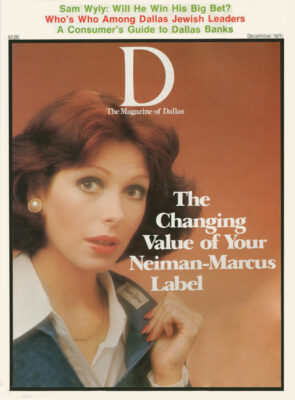No two readers will respond in quite the same way to the Neiman-Marcus cover story in this issue. Each of us, I suspect, has particular memories or anecdotes we could relate about the store, which in itself exemplifies how successfully Stanley Marcus established a personal aura for Dallas’ most famous institution.
Like many of our readers, this magazine has had a close relationship with Neiman-Marcus. Mrs. Jerrie Smith, a member of the Marcus family, was one of the early founders of the magazine and continues today as an active member of our board of directors. The store itself was instrumental in introducing us to Dallas through a mailing to its customers prior to our first issue.
The cover headline, “The Changing Value of Your Neiman-Marcus Label,” was selected as an obvious play on a characteristic of Neiman’s customers made famous over the years. There are countless stories of people who would sew in Neiman-Marcus labels upside down so that, when their coats were taken off the shoulders and laid back on a chair or pew, the people behind would have little difficulty in identifying the garment’s lineage. As the Neiman’s myth grew, the Neiman-Marcus label became a status symbol in its own right. After all, it was much more useful than a Mercedes 450SL or a house on Beverly Drive: it could be removed and sewn into some lesser garment to which it didn’t properly belong. Neiman’s officials are quick to point out that, while myths and status symbols may pass, the dedication to quality which gave birth to both is very much alive and well
Their point is well taken, but it does little to relieve the nostalgia for those days when Neiman-Marcus endowed a rough-and-tumble town with grace and style. It goes without saying that this is an age of change, and nobody would hesitate to grant Neiman’s the right to stay abreast of the times. But I, for one, regret the passing of those myths and symbols. Because they added so much to this city’s spirit and because they were so much fun.
The Citizen’s Charter Association was formed in the 1930’s when downtown businessmen led a reform movement to establish a clean and efficient city administration under a council-manager form of government. As everybody knows, the CCA worked well as a means of recruiting good candidates and electing them to office. It reached the pinnacle of success under Mayor Erik Jonsson, whose Goals for Dallas became a unified citizens’ effort for civic improvement. Since then, it has been all downhil
The CCA has outlived its usefulness. Following the mayoral defeat of 1971, the organization became nothing more than a group of men and women desperate for one thing: political victory. With this goal as its only reason for existence, the CCA allowed the tail to start wagging the dog. In 1973 it endorsed George Allen for an unprecedented third term, in violation of its own rules, simply because it couldn’t stop him from running. As criticism mounted, the CCA responded by “broadening it base” – which con-sisted of choosing candidates who could win without regard to how well they would serve. And in 1973 the CCA did win, electing people such as Lucy Patterson to the city council. It was this “victory,” more than John Schoellkopf’s later mayoralty defeat, which spelled the end of the CCA. It’s now time for the funeral.
How do we encourage good men and women to run for public office? Can a formal organization set itself up to recruit candidates and urge their election? Would a new organization in the place of the CCA merely fall victim to the same pressures? Should the business community use its two major assets, brains and money, to move in an entirely different direction, perhaps establishing a watchdog agency to report on the performance of elected officials without actually endorsing candidates?
I wish the answers came as easily as the questions. All that is clear now is that it’s time for more than new faces – it’s time for new thinking.





